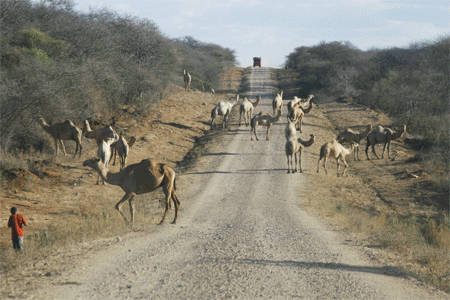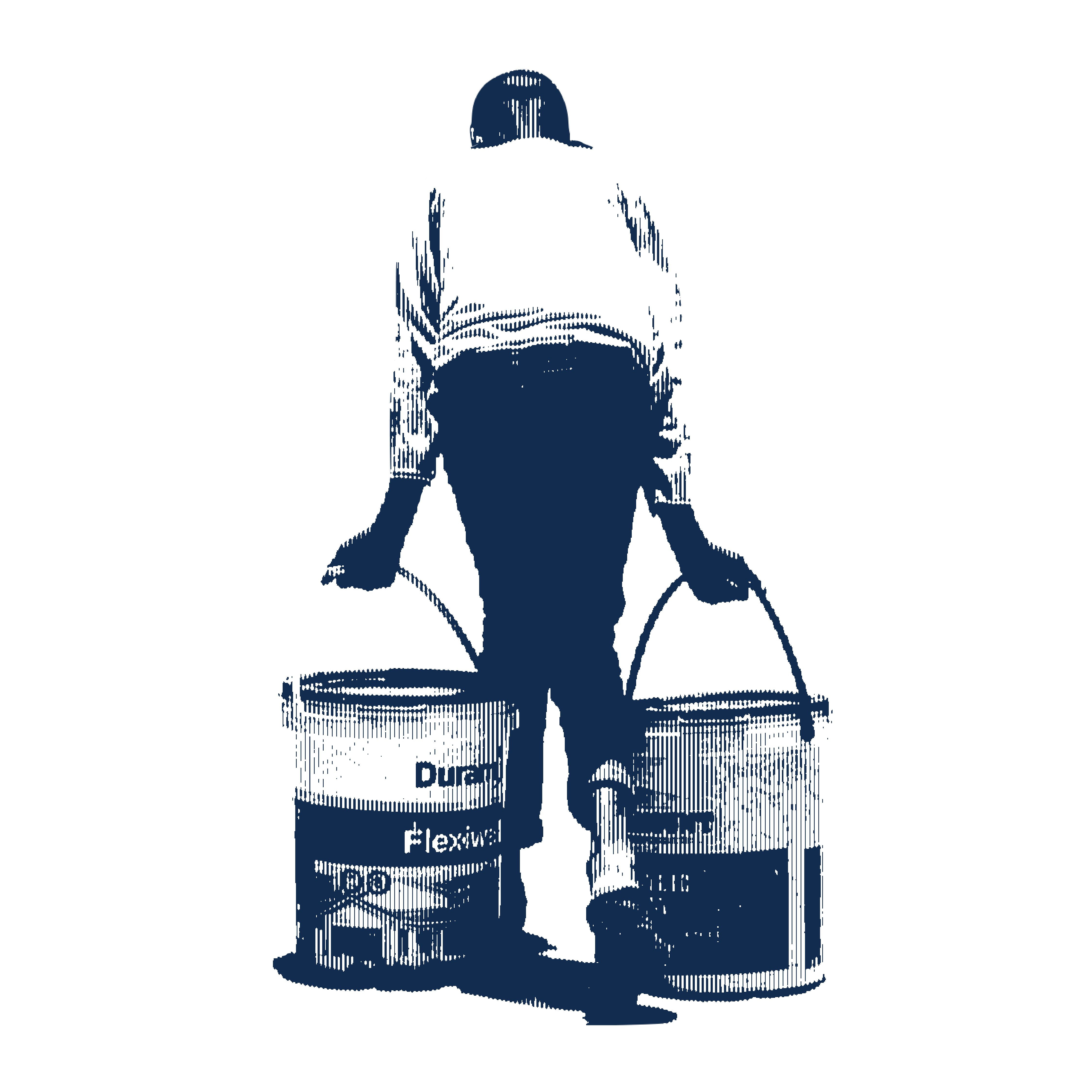
We stood in the pre-dawn glow of the streetlamps, greeted by intoxicated heckles from the previous night's most diligent drinkers. A battered, extended cab Toyota Hilux pickup pulled up, carrying a mound of mysterious goods under a green tarp and bearing faded Ethiopian Red Cross decals on its doors. Seeing there were already three passengers inside, I almost threw in the towel right there and sent my colleagues Ernest and Julia on without me, motivated as much by the impracticalities of fitting so many people into such a tiny space as I was by the thought of my still-warm bed waiting for me just down the block.
I'm still not sure I made the right decision in allowing my backpack to be haphazardly strapped to the top of the green mountain, and folding my legs practically against my chest so as to wedge myself into the cab.
Though I'd never met any of them before, I knew the man seated directly in front of me, whose heavy briefcase was now wedged under my arm. He was Salihu Sultan, a regional director for the Red Cross, who'd offered to take us on a quick tour of the water issues in the south on his way to distribute medical supplies in a remote region called Arero. The driver and middle passenger hadn't been introduced, adding to the enigmatic feel of our 3 a.m. departure, though they were later revealed to be Salihu's two brothers.
At first my sleepiness got the better of me and I settled in almost comfortably, but even before the asphalt road disintegrated just past Awasa, the pressure of six bodies, five bags and an inexplicable electronic keyboard inside the Hilux began to take its toll on me.
Luckily, I soon had plenty of time to stretch my legs as we changed two punctured tires in rapid succession, the second requiring Salihu and his younger brother to venture ahead on the bus to the next town to get the tubes repaired while we waited, sharing awkward smiles with the locals who lived there along the road.
We ate "lunch" in Hagere Selam, though it was already close to sunset, and as we drove on up the winding, verdant road, it started to sink in just how far away from anything recognizable, and how powerless over my own situation I was. I felt a gnawing panic. When, and where would we finally arrive, and how would we eventually retrace the mounting kilometers of jagged roadway leading back to Addis?
Salihu had informed us that it was at least another 200km to Negele, which was the nearest place we could spend the night if he was to make it on to Arero in time to start his screenings and distribution of supplies the next day. My faith in the Hilux and its four worn tires had been deteriorating in step with the road conditions, especially after watching a teenage mechanic back in Hagere Selam stuff three or four scraps of old rubber tubing inside one of them as padding.
The fear slowly eased out of me as the sun set, blazing an orange trail of clouds across the horizon, past the expansive lowlands spread out below us.
I woke up to a frantic moaning from the front seat. We'd stopped, and Salihu's brother was beating his own forehead with a closed fist, as a group of wailing, shrouded figures pulled him from the car.
We were parked in the moonlight facing a large dimly lit tent between two rows of mud buildings. As the silhouettes outside the cab embraced, I recalled Salihu mentioning earlier that his grandfather, who lived in Adolla, was very ill. He must have died just before we arrived; all of the hurrying, the driving through the night hours and the rushed meals along the way that had seemed so uncharacteristic of Ethiopian culture as I knew it started to make sense.
Ernest, Julia and I just sat frozen in the back seat of the truck in the darkness, not wanting to make a burden of ourselves as guests in the middle of the crisis. We began contemplating how Salihu and his brothers has put on such a show of hospitality and friendliness for us over the last 18 hours, even with the imminent death looming over them.
In our culture, a family emergency is the ultimate excuse to disengage from obligations. But here Salihu had insisted on honoring his commitment to bring us with him even though he had no responsibility to help us in the first place, other than a cultural sense of hospitality that seems to overcome the good sense of most Ethiopians.
After a time, he emerged again and hurried us inside the tent. A dozen men in keffiyehs and robes were reclining on mats at the far side of a tent, surrounded by scattered, leafy branches.
Even through my exhaustion, it didn't take long to realize that I was finally laying eyes on the plant that I'd heard so many rumors about as we'd researched the East Africa project back in the States. In recent years, the DEA has declared khat illegal in the U.S. and they've deported several of Somalis from the Seattle area for importing it from East Africa. I'd also heard many Somalis bemoan the financial drain that the drug is on their country, as it is hugely popular there, but only grown in neighboring countries like Ethiopia.
We were invited to sit with the men, and before long I was chewing away at my first mouthful of the fresh shoots from the top of the branch I'd been handed. The taste was bitter and tannic enough that a swallow of water washing it down tasted as sweet as Coke by contrast. It seems to me that that psychotropic effects of khat have been overstated, although the mere fact that I was able to remain conscious at that point may be a testament to its potency as a stimulant.
Despite everything, Salihu remained anxious to cover the final 100 kilometers in order to reach Negele that night, so I filled my pockets with some of the remaining leaves, and we piled back into the cab.
Somehow the mood in the Hilux lightened once we left, as if the hour of intense public mourning between Salihu's family had been enough to acknowledge the death of the patriarch, who at about 65 years had lived a long life by Ethiopian standards.
It was 3 a.m. again before we finally reached Negele. Contemplation of the cultural differences in mourning practices quickly gave way to weary frustration at the growing welt on my shoulder as it was methodically beaten against the truck door, and fantasies of the warm bed and shower that might await our arrival.
We arrived in a town much smaller than I'd guessed from the glow of its lights on the horizon, and a hotel where the taps had all run dry. Still, a full 24 hours and 600 kilometers after we'd departed, it was hard to think about much more than sleep.
Read more:
Heading South Part 2: A Night in the Bush
Heading South Part 3: A Night at the Yabello Motel
Heading South Part 4: A Night Under the Stars
Heading South Part 5: A Dawn With Dion






